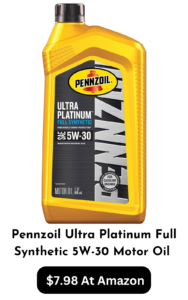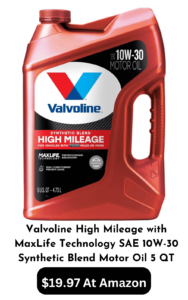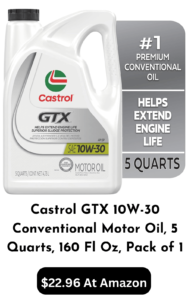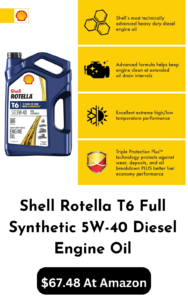What Kind of Oil Does My Car Take
Regular maintenance includes changing the oil and filter. This service is so simple that everybody can do it. Even though it’s easy, using the right oil in the engine is one of the most important things you can do.
A variety of oil types and viscosities are available; choosing the wrong one could lead to unexpected and costly repairs. Depending on your engine, you may need four to eight quarts of engine oil, which can cost anywhere from $20 to $68 or more per quart.
Having the correct oil to protect the engine is more important than how much it will cost to change the oil in your car. The following information will help you select the best motor oil for your vehicle.
What does oil do in a car?
If you want to know why it’s so important to choose the right oil for your engine, you should know what functions motor oil performs. To keep moving parts from grinding against one another, oil is primarily used as a lubricant. It does this by creating a thin layer of molecules that serve as miniature ball bearings. In addition to its role as a lubricant, engine oil also:
- Protects metals from corrosion and oxidation by applying a coating.
- Makes moving parts more frictionless
- It cleans the crankcase by dissolving and washing away deposits and sludge.
- Transfers heated oil to the engine’s oil cooler to keep it at the proper operating temperature.
- Reduces the acidity of combustion byproducts
- These protective qualities can be diminished if the incorrect grade of oil is used.
How to Determine What Kind of Oil Does My Car Take
You can use the following steps to figure out What Kind of Oil Does My Car Take.
Check Your Owner’s Manual
It is highly recommended that you begin by consulting the owner’s manual for your vehicle. In addition, it will provide information regarding the type of oil and viscosity that is recommended for your vehicle.
Check the Oil Cap
The recommended oil type and viscosity are typically printed on the label that is located on the oil cap of the engine of your vehicle.
Consult with a Mechanic
If you are unsure about the type of oil that your vehicle requires, you should seek the advice of a mechanic or the dealership where you purchased your vehicle.
Choose the Correct Oil Grade
An engine oil grading system was established by the Society of Automotive Engineers (SAE). A common grade of engine oil is 5W-30, and its grading provides a general explanation of its performance.
Because the W in the number represents winter, the first part of the number, 5W, indicates how well it pours when the temperature is low. In cold weather, a lower number indicates better flow.
At room temperature, the oil weight is indicated by the second part of the number, which is 30 in this particular case. As the temperature rises, the thickness increases proportionally.
Typically, the engine oil cap will have the grade you need marked on it. It is also available online or in the booklet that comes with your vehicle as a routine maintenance guide.
The lower of two possible grades given by your handbook is the one you should use for driving in the winter. A vehicle’s engine oil recommendation might change from 5W-20 in the summer to 0W-20 in the winter.
What type of oil is best for my car
You can choose from a variety of oils, each with its special qualities and uses. Here are the most popular kinds of oil:
Conventional Oil
This type of oil is the most common and can be used in most passenger cars. Your car’s engine will stay well-lubricated with this mixture of hydrocarbons derived from petroleum.
Refining is necessary before using crude oil in an engine after it has been extracted from the earth through various methods.
After the contaminants have been extracted, it is combined with additives and detergents that will maintain the cleanliness and protection of your engine.
After conventional oil has been used in an engine, it starts to deteriorate. After a few months or thousands of miles, it becomes saturated with particles and pollutants that could harm the engine, and its protective properties decrease.
Because of this, changing the engine’s oil is crucial, as it allows for removing and disposing of these dangerous compounds.
Synthetic Oil
To better lubricate and protect your vehicle’s engine, this oil is composed of chemical compounds. Although it costs more than regular oil, it lasts longer between changes and performs better.
Many people mistakenly believe that synthetic oil is entirely synthetic. Similar to regular oil, it is made from crude oil. But the process of refining is more thorough.
Because their molecular sizes are more uniform, synthetic oils provide superior protection for engine components.
Since it is a higher-quality base oil to start with, its chemical stability, resistance to oxidation, and preservation of protective properties are all improved.
Synthetic engine oil typically contains high-quality additives and detergents blended with a superior base oil.
For these reasons, as compared to conventional oil, synthetic oil lasts longer, protects better at higher temperatures, wears less easily, and keeps the engine cleaner.
Synthetic Blend Oil
These are designed to protect engines from higher loads and high temperatures, and they contain a combination of organic and synthetic oils.
In most cases, this means they’re not as easily vaporized, which means less oil loss and better gas mileage.
People who drive pickups or SUVs often use these oils because they provide additional protection for the engine during duties that are more taxing on it, like pulling heavy objects.
In comparison to full synthetics, they are also considerably more affordable, costing only a few cents more than a high-quality conventional oil at times.
Higher-Mileage Oil
Modern automobiles are built for long-term use. Another option for oil is oils designed for vehicles with higher mileage, which are ideal for people who want to pay off their car and drive it well into the six figures.
The odometer reading on nearly 66% of the cars on the road is greater than 75,000 miles. Because of the high level of interest in this topic among oil consumers, several oil companies have developed new oils specifically for these vehicles.
How long can a car go without an oil change?
Most vehicles have an oil change interval of 5,000 to 7,500 miles. In addition, synthetic oil allows you to go 10,000 or even 15,000 miles without changing the oil in your vehicle. If you would like to know more about oil changes, you can either read on or use our online scheduling tool.
How much oil does my car need?
Engines typically need 5 to 8 quarts of motor oil, throughout the year. Although it is only a rough estimate! Check the handbook for your vehicle to find out how much oil it can hold.
Related Articles
- 10 Reason Why does my car smell like gasoline?
- Where Can I Work on My Car for Free or Cheap?
- Read More With Official Tech Info
FAQs
What is the best oil for my car?
Car type, driving conditions, and driver preference all play a role in determining the optimal oil for your vehicle. For guidance on selecting the optimal oil for your vehicle, refer to your owner’s manual or seek the advice of a mechanic.
How do I choose the right oil for my car?
The ideal motor oil viscosity for your engine is specified in your owner’s handbook. Choose the correct engine oil by thinking about the oil’s viscosity and type.
Can I use synthetic oil in my conventional oil engine?
You can use synthetic oil in engines that use conventional oil, but it might not work as well as in engines that use synthetic oil.
What happens if you put the wrong oil in your car?
Due to insufficient lubrication, using the incorrect engine oil can result in engine failure. Without lubrication, the moving parts will come into contact with one another. Soon after, friction sets in, leading to engine component wear.
Conclusion
Your car’s performance, gas mileage, and life expectancy will be greatly affected by the oil you use. You can keep your car running smoothly and efficiently by learning about the various kinds of oil and asking yourself, “What kind of oil does my car take?” Always check the oil cap, refer to the owner’s manual, or get your car checked by a mechanic if you aren’t sure what kind of oil it needs.




